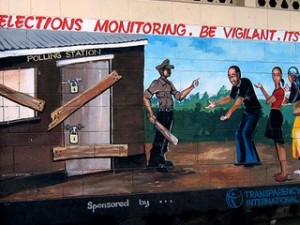Free newspaper — paid news?
ø
Persephone Miel
Image – my own snapshot of the paper version of Metro, since the online version doesn’t have the graphics.
encouraging collaborative, practical research and analysis of the new media (r)evolution
ø
Persephone Miel
Image – my own snapshot of the paper version of Metro, since the online version doesn’t have the graphics.
 A new case study over at Internet & Democracy, The Role of the Internet in Burma’s Saffron Revolution, has given rise to a discussion at the I&D blog, where Veronica Alfaro has challenged what she sees as its overly pessimistic assessment that the protests did not lead to “tangible political change.” You can join the discussion here.
A new case study over at Internet & Democracy, The Role of the Internet in Burma’s Saffron Revolution, has given rise to a discussion at the I&D blog, where Veronica Alfaro has challenged what she sees as its overly pessimistic assessment that the protests did not lead to “tangible political change.” You can join the discussion here.
Ivan Sigal has written some interesting posts about Burma at his Burning Bridge Blog.
 The busy folks at I&D have also just released a study on the role of networked digital technology in the period of violence following Kenya’s elections. A fascinating example of diaspora and in-country activists using SMS, blogs and other tools to combat attempts to spread hatred and violence using the same networked tools. Folks interested in the Kenya case will also want to check out James Deane and Jamal Abdi’s policy briefing on the role of the media generally, which they wrote for the BBC World Service Trust.
The busy folks at I&D have also just released a study on the role of networked digital technology in the period of violence following Kenya’s elections. A fascinating example of diaspora and in-country activists using SMS, blogs and other tools to combat attempts to spread hatred and violence using the same networked tools. Folks interested in the Kenya case will also want to check out James Deane and Jamal Abdi’s policy briefing on the role of the media generally, which they wrote for the BBC World Service Trust.
Myanmar-Monks, uploaded on July 26, 2007
by worak
Kenya Election Mural, uploaded February 4, 2008
by OpenDemocracy
Scary must-read column by Michael Bush from this morning’s Ad Age email reports that “19% of the 252 chief marketing officers and marketing directors surveyed said their organizations had bought advertising in return for a news story” and quotes the CEO of the company that did the study saying “I’m not saying it’s a huge problem,” Mr. Hass said. “But 19% of senior marketers saying they do it constitutes a problem.” Never mind that if 19% admit that they do it, how many might actually be doing it??
said their organizations had bought advertising in return for a news story” and quotes the CEO of the company that did the study saying “I’m not saying it’s a huge problem,” Mr. Hass said. “But 19% of senior marketers saying they do it constitutes a problem.” Never mind that if 19% admit that they do it, how many might actually be doing it??
If you care about the credibility of the online media, you’ll think the problem is huge. Read the whole article to find out how many marketing people said the marketing industry as a whole is not following ethical guidelines in the new-media realm, it’ll send chills down your spine. Besides educating the public to be more skeptical, as Dan Gillmor recommends, is this more the problem of the PR industry failing to live up to a code of ethics? Or the failure of the traditional and/or online media who accept these deals, failing to live up to their own standards? Which is easier to do something about?
Public Relations Society of America Member Code of Ethics 2000 – “Preserve the free flow of unprejudiced information when giving or receiving gifts by ensuring that gifts are nominal, legal, and infrequent.”
A Bloggers’ code of Ethics (from Cyberjournalist.net) “Deny favored treatment to advertisers and special interests and resist their pressure to influence content. When exceptions are made, disclose them fully to readers.”
American Society of Newspaper Editors Statement of Principles “Journalists must avoid impropriety and the appearance of impropriety as well as any conflict of interest or the appearance of conflict. They should neither accept anything nor pursue any activity that might compromise or seem to compromise their integrity.”
See also links to many journalism ethics codes from traditional media groups, helpfully collected by ASNE.
*Disclaimer: I have friends who work or have worked in PR who are wonderful and honorable people. Just as I know at least one honest real estate agent, who also happens to be a journalist, book author, and an occasional blogger, (and no, I get no kickbacks for promoting her stuff, she’s just a friend whose work I enjoy and you should too) I’m sure that there are many other good folks in PR, who know the extent of the truth behind the stereotypes of their industry and will therefore have the good sense not to be offended by this headline.
Image: Handshake-Money
Uploaded to Flickr by A. www.viajar24h.com
ø

UPDATE 8/8/08 – If you only read one thing about this story, go directly to John McQuaid’s excellent wrap-up analysis. The short version is that ABC’s Brian Ross has given an interview making clear that the whole thing was a lot less sinister than some of us worried.
About 3 million Americans were watching as you reported that the deadly Anthrax sent to politicians and journalism organizations could be traced to Saddam Hussein’s chemical weapons program. You were given this information by people you had reason to believe had access to the investigation and who insisted on anonymity. Telling the understandably terrified American people in the weeks after 9/11 that Iraq might be behind the Anthrax attacks clearly helped make the Bush administration’s case for war in Iraq. So, what do you do when you learn your anonymous sources were lying to you and you in turn were lying to your audience?
In an interesting test of whether online-only media can challenge the powers-that-be, Salon’s Glenn Greenwald makes a case that ABC News was deceived by sources whom it promised anonymity about the source of the 2001 Anthrax attacks and in turn deceived its massive audience, helping make the case for war against Iraq. My fellow Fellow and Center for Citizen Media founder Dan Gillmor, of Arizona State University and NYU’s Jay Rosen are leading a charge to get ABC to answer these charges and reveal who was using them to perpetrate this deadly manipulation of public opinion? They have come up with the following three questions that they want ABC to answer. What will it take to get ABC to respond? Here are Dan and Jay’s questions:
Three Vital Questions for ABC News About its Anthrax Reporting in 2001
1. Sources who are granted confidentiality give up their rights when they lie or mislead the reporter. Were you lied to or misled by your sources when you reported several times in 2001 that anthrax found in domestic attacks came from Iraq or showed signs of Iraqi involvement?
2. It now appears that the attacks were of domestic origin and the anthrax came from within U.S. government facilities. This leads us to ask you: who were the “four well-placed and separate sources” who falsely told ABC News that tests conducted at Fort Detrick showed bentonite in the anthrax sent to Sen. Tom Daschle, causing ABC News to connect the attacks to Iraq in multiple reports over a five day period in October, 2001?
3. A substantially false story that helps make the case for war by raising fears about enemies abroad attacking the United States is released into public debate because of faulty reporting by ABC News. How that happened and who was responsible is itself a major story of public interest. What is ABC News doing to re-report these events, to figure out what went wrong and to correct the record for the American people who were misled?
There’s lots more to read: Glenn’s original posts Vital unresolved anthrax questions and ABC News and Journalists, their lying sources, and the anthrax investigation, are followed up today with Additional key facts re: the anthrax investigation, which includes links to much of the follow-up, including John McQuaid declaring the blogosphere officially “aflame.” Jay and Dan’s excellent posts exploring the journalistic implications (and follow-ups via Twitter here.) Comments threads on the Blotter, the website of Brian Ross’ Investigative Unit are calling for ABC to investigate.
I absolutely agree that ABC should explain how this story came to be, but am withholding judgment on whether and how their sources should be named based on that investigation. On the not so black-and-white front, people I respect who’ve worked with Brian Ross on other stories give him a lot more credit for journalistic integrity and the ability to admit mistakes than Glenn Greenwald does, which leads me to hope that demanding an investigation doesn’t become a personalized witchhunt. But I’ll be watching to see what it takes to get the attention of ABC News, or its parent company Disney.
“At Disney, each of us is responsible for upholding our excellence and our integrity. This means acting responsibly in all our professional relationships, in a manner consistent with the high standards we set for our business conduct.”
– Bob Iger
President and Chief Executive Officer (from Disney’s corporate site)
Note: Very light blogging in August as my writing energy goes into wrestling with my white paper in progress. I fear only one of us will survive this epic battle.
Images: Mickey Mouse dressed up for the holidays by Zengrrl via Flickr.
 If you don’t haz broadband you don’t haz convergence, duz u? Thanks to the still-young site Ground Report, I came across the Communication Workers of America Speed Test. Try it out, it’s a great way to drive home what my fellow fellow David Weinberger pointed out earlier this week: the US is in 15th place (out of 30 developed countries) in broadband penetration and far from the top in any number of other measures.
If you don’t haz broadband you don’t haz convergence, duz u? Thanks to the still-young site Ground Report, I came across the Communication Workers of America Speed Test. Try it out, it’s a great way to drive home what my fellow fellow David Weinberger pointed out earlier this week: the US is in 15th place (out of 30 developed countries) in broadband penetration and far from the top in any number of other measures.
The US? In 15th place in something as important to our economy as broadband? Naturally the mainstream media everywhere are abuzz with this story, demanding answers from our elected officials, etc. Um, NOT. Searches on Yahoo and Google News turned up exactly TWO articles on the sites of general interest publications (not counting BusinessWeek and several computer/tech publications): The San Francisco Chronicle covered it on its Tech Chronicles blog, and the Capital Times, in Madison, WI ran an article, with an actual byline. Bravo, Capital Times! Both quoted the media reform folks at Free Press.
So will participatory media pick up the slack? So far, doesn’t look like it. (I would love to be proven wrong) Isn’t this a perfect issue (geeky and political and yet ultimately affecting Joe Couch Potato too) that “the” blogosphere (or rather, a couple of the multitude of blogospheres) should be up in arms about, forcing traditional media and ultimately politicians to pay attention? Where is a celebrity blogger when we need one? (If you are one, the OECD data is here; interesting resources also at the Information Technology & Information Foundation.)
I shall be supporting the Communications Workers Speed Matters campaign while waiting for the public outcry to start.
Photo: Darren Hester for openphoto.net CC:Attribution-NonCommercial
tags: OECD, broadband, Free Press, Communications Workers of America
At a conference in rainy Atlanta, Krishna Bharat of Google News showed slides illustrating what I had previously observed : how news aggregators help bury original investigative reporting. The computer, he says, “notices that a story is hot” due to “aggregate editorial interest,” meaning the same story turns up in multiple sources. So, every newspaper, agency, website, TV and radio newscast, etc. mentions the Clinton/Obama plagiarism story and correspondingly it comes up at the top of Google News.
This is exactly what does not happen with a single investigative story, no matter how good the reporting, how reliable the source (the case I originally wrote about was NPR, but it could just as easily have been the San Jose Mercury News), or how potentially important the story. It’s not the fault of Google News of course, they’re only reflecting what happens in the media world that existed before them. Certain news items create a feeding frenzy, others float off into oblivion.
Later in the day the phrase “the cream rises to the top” was spoken at least twice in an hour-long panel. How do we test whether that is really true?
NPR’s Ari Shapiro did two great* stories today continuing his investigation into a report that Army officials told the VA hospital at Fort Drum last year to stop giving veterans advice on filling out their disability forms, with the result that many didn’t get the benefits they deserve. And (statistically speaking), no one (in vast, multifaceted, all-powerful cyberspace) noticed.
Today’s stories in Morning Edition and All Things Considered follow up the Jan. 29th Morning Edition story on the same event, with the Army denying flatly that it was true. Today, they produced a memo describing the meeting at which the Army “tiger team” told the VA to stop advising vets. Army Surgeon General Eric Schoomaker was forced to go on record saying there had been a “miscommunication.” You go, NPR!
But will this latest Walter Reed-like story reach anyone who didn’t have the radio on today? Not so much. It doesn’t come up in the “top news” anywhere on the web; the other mainstream media are too proud to repeat someone else’s investigation (note that there were supposedly other reporters at the briefing with Schoomaker, where are their reports?). You can find the NPR story by searching for “fort drum” on google or yahoo news, but only if you’re looking for it. I found exactly one reference to the NPR story on a blog called prairieweather.
I thought maybe it wasn’t fair to expect the blogs to react so quickly, the story was only on today after all. So I went to look for the earlier story. According to Technorati, the original (equally disturbing) story that came out 9 days ago was picked up by:
One blog called Main St. USA where it got 1 comment
One blog called ‘Imagine’ A World of Peace, Tolerance, Understanding no comments
WWTI, the local TV station’s site in upstate New York comments not allowed
and Veterans for America comments not allowed
Not what I would call a firestorm of moral outrage.
Does this mean that none of the contributors to any of the “big” blogs listens to NPR? That none care about veterans’ issues (although to me, the Army possibly covering anything up is significant beyond that which is being upcovered)? If NPR allowed comments on their website would people comment there and would that create any resonance?
For me, this is where the “cream will rise to the top” theory crashes and burns. In addition to being well-reported by an award-winning reporter at a reputable news organization, this story has everything: it’s political, it’s potentially useful to vets who might have been denied benefits unfairly, it builds on the Walter Reed story, it’s ideally suited to citizen journalism (someone needs to find the other 10 hospitals visited by the deserves-to-be-infamous Col. Becky Baker and find out what she said there). But except for the Army’s public clarification with regards to Fort Drum, I’m betting it sinks without a trace into the blood-dark sea of election horse-race commentary. I hope someone proves me wrong.
Persephone
*Actually I didn’t think it was a perfect story because they let Army Surgeon General Eric B. Schoomaker off the hook with saying “it was a misunderstanding, we never meant for them to think that” even though it seems very likely he’s lying through his teeth, but that’s nitpicking.